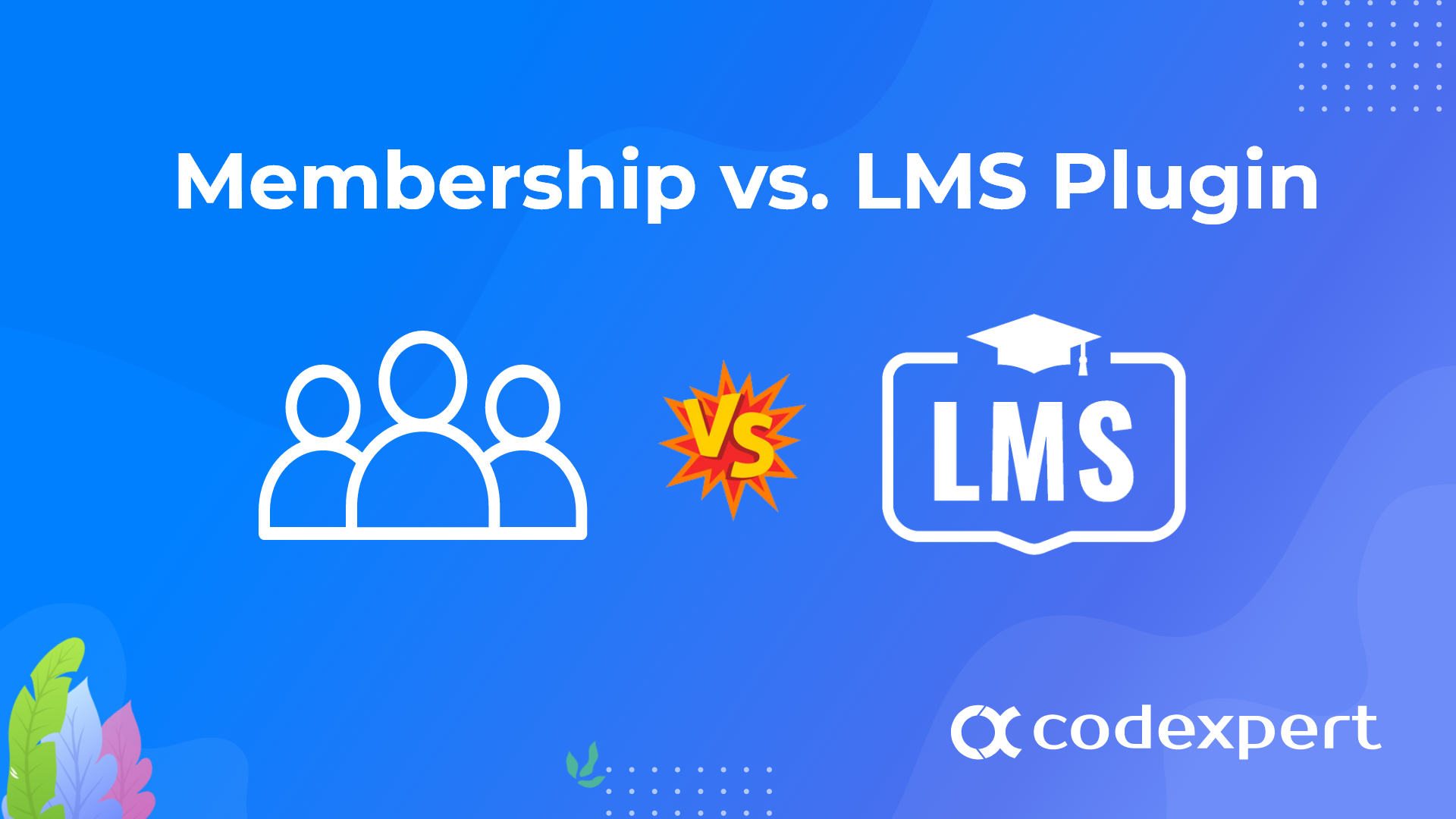Membership vs. LMS plugin: which is the best for you in 2024?

LMS stands for learning management system. LMS plugins manage course modules, lessons, quizzes, instructors, and students for you. These plugins let the users and administrator track the progress of courses. You can also create online training programs and sell courses.
There are lots of LMS plugins for WordPress. But among them, only a few became the most popular among online course sellers and trainers. With any of these plugins, you can turn a regular WordPress website into an online course-selling platform.

Features of LMS Plugins
Different LMS plugins offer unique features according to course creators’ preferences. But they have similarities in core functionalities. All the LMS plugins have the following features in common:
- Student enrollment,
- Subscription-based courses,
- Quiz creation and scoring,
- Certificate builder,
- Uploading course content,
- Creating sales pages,
- Allowing your users and admin to track their progress, etc.
Although most WordPress LMS plugins are premium, only a few offer free versions but the premium versions are totally worth it. LMS plugins can be installed and set the plugin up easily. You can create an online course platform without any coding knowledge or hire any developer. LMS plugins are fully scalable and their features get rich day by day. Ultimately LMS plugins grow as your business grows because developers add new features according to the feedback from the users.
LMS plugins are easy to update and maintain. In fact, most of the LMS plugins have regular system updates and improved features that won’t charge you any extra penny. Also, these plugins are compatible with most of the marketing tools and payment methods. You can even customize your eLearning platform including checkout and cart page using CoDesigner. So, you won’t need to worry about integration and spending hours searching for compatible payment methods.
Top LMS plugins for WordPress –
- Learndash LMS
- CoSchool
- LearnPress
- Tutor LMS
- Academy LMS
- WP Courseware
- Lifter LMS
- MasterStudy LMS
- Sensei LMS.
- Namaste LMS

Cloud-based LMS Solutions
Cloud-based technology is a revolutionary innovation for mankind. In the past, we had to carry floppy disks, CDs, and DVDs to share, store, and access data. The cloud-based solution omitted the necessity to carry such devices and made our lives easy. Now we can access, transfer and share any data with the help of this technology. That’s how online education came into reality. This made education more accessible and free. Any student can join and participate in an online course, classes, and quizzes with just a device that has access to the internet.
WordPress covers more than 35% of the internet and helps so many educators to run their learning platform without much maintenance cost. But if you don’t have a WordPress website then you can try cloud-based LMS solutions. These LMS solutions usually charge per month. One of the main downsides of cloud LMS is that you won’t have as much control as WordPress plugins.
The main difference in membership is you won’t have the option to manage and create structured courses, quizzes, module lessons, student progress tracking, etc. This type of plugin helps you to manage your users, allowing or restricting them from certain content, password-protected content or course modules, etc.
Some of the best Cloud LMS include –

Differences between Cloud LMS and LMS Plugin
LMS plugins provide you with full control over everything you want to manage on your online course website. On the other hand, you won’t have access to change everything on a cloud LMS. If you use an LMS Plugin, you can either hire someone or send a quote to the developers of the plugin to extend or add a new feature. Cloud LMS doesn’t offer this option as the same platform is used by many other users. This type of LMS solution doesn’t offer many customization options for the user. In the case of LMS plugins, this is completely the opposite situation.
The LMS plugins market is very competitive and the developers are always on the run to add as many valuable customization options as possible. They also offer dedicated support for the users but only the popular cloud LMS offer this type of support. If you are an entrepreneur and want to build an online course platform then choosing WordPress as a CMS and using an LMS plugin would be ideal for you.

Features of Membership Plugins
Membership websites usually offer gated content and limit access to different parts of the website. These premium contents can only be accessed after subscribing to a membership plan on the website. You can offer a free subscription with limited access and a paid subscription with premium content access. Every bit of your site can be protected with the membership plugin.
You can easily restrict pages, posts, special offers, ebooks, courses, webinars, quizzes, interviews, exclusive articles, etc. Most of the membership plugins let the members interact with each other in private messages, forums, and topics. You can also make the interactions subscription-based. You can easily charge your users by setting up an automated registration process, integrating with payment gateways.
Membership plugins offer drip content options to release content after a certain time or after completing a specific step. You can set different pricing or assign certain subscription plans to contents and release them one by one in a timely manner.
Top membership plugins –
- MemberPress
- Paid Memberships Pro
- Ultimate Membership Pro
- WooCommerce Memberships
- s2Member
- MemberMouse
- Paid Member Subscriptions

Differences Between an LMS and Membership Plugin
It’s important to understand the difference between an LMS and membership plugins in order to choose the best solution for you. LMS and membership plugins do have some similarities in their functionalities. You can use membership plugins to sell subscriptions on a single level or more, offer free and paid courses, and grant access to specific lessons. However, membership plugins don’t have the structures that LMS provides within a course.
You won’t be able to offer quizzes, certificates, assignments, scoring, prerequisites, progress tracking, and module-to-lesson structure using a membership plugin. But you can use membership plugins for a single course and set different tiers to it. With LMS you’ll get all the structures to run an online course platform and offer various courses using it. Modern LMS plugins offer gated content without using any membership plugin. LMS plugins are self-hosted which means you can host them on your own server.
Conclusion
It’s easy to decide between a WordPress LMS plugin and a membership plugin if you have a clear vision and purpose. If your target is to sell restricted content and is not focused on creating online courses then you should go for a membership plugin. If you are interested in student enrollment, creating online courses, quizzes, and other learning materials then you should try an LMS plugin instead.
Subscribe to Our Newsletter
Get the latest WordPress tutorials, trends, and resources right in your inbox. No Spamming, Unsubscribe Anytime.

Thank you for subscribing to our newsletter!










